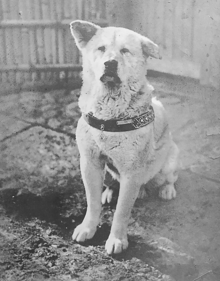Hachi: A Dog’s Tale is a film adapted from a true story in Japan, directed by Lasse Hallström and starring Richard Gere. The film tells a moving story of loyalty, love, and waiting, showcasing the profound emotional bond between humans and dogs. With its deep emotional resonance and poignant storyline, the film not only moves the audience but also encourages deep reflection on the relationship between humans and animals, as well as the preciousness of life.

The story of Hachi: A Dog’s Tale takes place in a small town in the United States and revolves around the bond between a professor named Parker (played by Richard Gere) and an Akita dog named Hachi. Hachi is found by Parker under a chance circumstance, and Parker brings him home, where they begin their daily life together. A deep bond is formed between Hachi and Parker, especially Hachi’s loyalty to Parker, which reaches an almost unbelievable level.
Every day, Hachi accompanies Parker to the train station in the morning, seeing him off, and waiting eagerly for his return in the evening. This daily routine becomes the foundation of Hachi’s life, marked by unwavering loyalty. Even after Parker’s sudden death, Hachi continues to wait at the train station every day, waiting for a return that will never come, until the end of his own life.
The film not only portrays Hachi’s loyalty and persistence, but also reflects the human capacity for empathy and care for animals. Through the interactions between Hachi and Parker, the film explores the profound emotional connection between humans and animals, as well as our responsibility towards the pets we care for. The plot is tightly woven, and the emotional depth is sincere, prompting viewers to reflect on how fragile life is, yet how eternal loyalty and love can be.

Theme Analysis
1. Loyalty and Companionship
One of the most prominent themes in the film is loyalty. Hachi’s loyalty to Parker goes beyond mere dependency; it stems from a deep emotional bond that cannot be easily explained. Hachi waits for Parker every day, not simply out of habit but because of a profound sense of connection. Hachi sees Parker off in the morning, waits at the train station in the evening, until one day Parker never returns.
This loyalty is truly stunning. We often see people showering affection on their pets, but in Hachi: A Dog’s Tale, Hachi demonstrates a form of loyalty that asks for nothing in return. It is not out of habit or expectation of reward but simply out of love for Parker. This form of loyalty is both moving and thought-provoking, prompting us to reflect on whether we, like Hachi, can show such unconditional love and companionship to those around us, whether they are friends, family, or even strangers.
Loyalty is not just physical companionship; it is an emotional bond. In today’s world, human relationships often become strained, and family ties are subjected to external pressures. Many times, our interactions with others are driven more by obligation or convenience than by heartfelt love. Hachi: A Dog’s Tale reminds us to cherish the people around us, especially those who give us their time and attention without expecting anything in return. It calls us to honor and value those who quietly stand by our side.
2. Love and Sacrifice
The film also explores the themes of love and sacrifice through Hachi’s story. Despite the grief of losing Parker, Hachi’s waiting becomes even more resolute. Hachi’s love is an unwavering, timeless love. Even after Parker’s death, Hachi continues to wait at the train station each day, in the hope of a return that will never happen. Hachi’s commitment to waiting, without expectation of any reward or return, is a perfect portrayal of sacrifice.
Hachi’s sacrifice is not just about loyalty to Parker, but also about respecting life and holding on to it. In Hachi’s world, Parker represented everything to him. His death left Hachi without a center in life, yet Hachi chose not to give up; instead, it chose to persevere, even though this perseverance had no promise of any end or resolution. This act of sacrifice illustrates the greatness and selflessness of love, reminding us of the times in our own lives when we are called upon to make sacrifices for those we love.
3. The Fragility of Life and the Eternity of Love
Through Hachi’s waiting, the film also raises awareness of the fragility of life. Parker’s sudden death forces Hachi to confront the pain of loss, a pain that is both overwhelming and helpless. However, Hachi does not stop waiting. Instead, it holds on to its unwavering belief in love and loyalty, even in the face of loss.
While Parker is gone, Hachi’s waiting symbolizes something greater: the eternal nature of love. Although Parker is no longer there, Hachi continues to wait with a love that transcends time and space, a love that exists beyond death. Hachi’s steadfastness leads us to reflect on the impermanence of life, yet it also reminds us that love can endure beyond the limits of time. This eternal love brings a sense of warmth and comfort, even in the face of loss.
4. The Emotional Bond Between Humans and Animals
Perhaps the most moving aspect of the film is the way it captures the deep emotional bond between humans and animals. Hachi is not just Parker’s pet; he is a part of Parker’s life. The connection between them is not limited to a simple master-pet relationship, but rather a profound bond that transcends species. The film portrays the sincere and pure emotions shared between Hachi and Parker, and this emotional depth reflects the love and loyalty that animals can offer humans.
Many of us may not experience such a bond with our pets as Hachi had with Parker, but the love and loyalty pets give us are real and worth cherishing. The relationship between humans and animals is often unspoken, yet it is profound. This connection can bring us warmth, comfort, and a deeper understanding of the world.
Emotional Expression and Cinematic Techniques
The film’s directorial approach is delicate and thoughtful. The director captures the nuances of Hachi’s emotional world, especially in his daily wait at the train station and his interactions with Parker. The pacing is well-controlled, and the emotional layers are rich, balancing moments of joy and sorrow. The music in the film also complements the emotional tone, enhancing the emotional experience of the story.
In particular, the film’s ending, where Hachi passes away after years of waiting, is deeply emotional. Even though Parker is gone, Hachi’s waiting persists, representing loyalty and eternal love. This final message resonates with the audience, reminding us of the profound emotional bond that transcends time and the impermanence of life.
Conclusion
Hachi: A Dog’s Tale is a deeply touching film that conveys themes of love, loyalty, sacrifice, and waiting through the story of a dog’s devotion. Hachi’s perseverance and unwavering loyalty serve as a powerful reminder to value the people and creatures around us, to cherish the love and companionship we receive, and to honor the sacrifices that are often made in the name of love.
The film is not just a story about a pet; it is a celebration of the emotional connections that bind us all. Hachi’s story may be heart-wrenching, but it is also deeply thought-provoking. It challenges us to ask ourselves if we can offer the same level of loyalty, love, and sacrifice to those around us. In a fast-paced world that often takes relationships for granted, Hachi: A Dog’s Tale calls us to slow down and appreciate the bonds we share, whether with our pets or the people in our lives.













